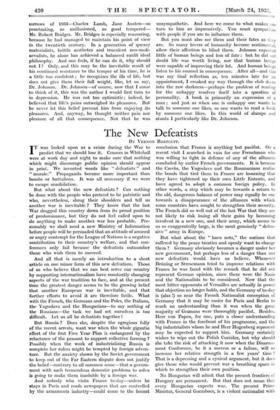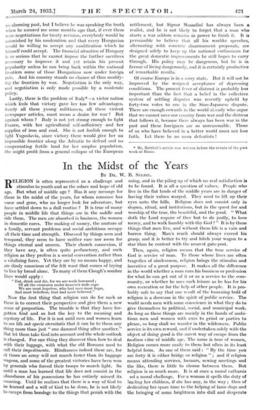The New Defeatists BY VERNON BARTLETT.
IT was looked upon as a crime during the War to predict that we should lose it. Censors in Whitehall were at work day and night to make sure that nothing which might discourage public opinion should appear in print. We invented words like " defeatists " and "morale." Propaganda became more important than bombs or battalions. It was all necessary if we were to escape annihilation.
But what about the new defeatists ? Can nothing be done with the people who pretend to be patriotic and who, nevertheless, shrug their shoulders and tell us another war is inevitable ? They know that the last War dragged this country down from its proud position of predominance, but they do not feel called upon to do anything to make another war less probable. Pre- sumably we shall need a new Ministry of Information before people will be persuaded that an attitude of amused or angry contempt for the League of Nations is a negative contribution to their country's welfare, and that con- ferences only fail because the defeatists outnumber those who wish them to succeed.
And all that is merely an introduction to a short article on one minor form of this new defeatism. Those of us who believe that we can best serve our country by supporting internationalism have constantly changing aspects of the war tradition to face, and at the present time the greatest danger seems to be the growing belief that another European war is inevitable, and that further efforts to avoid it are therefore futile. What with the French, the Gernians and the Poles, the Italians, the Yugoslays and the Hungarians—to say nothing of the Russians—the task we had set ourselves is too difficult. Let us all be defeatists together I But Russia ? Does she, despite the egregious folly of the recent arrests, want war when the whole gigantic effort of the first Five Year Plan is endangered by the reluctance of the peasant to support collective farming ? Possibly when the work of industrializing Russia is complete her rulers might be tempted by foreign adven- ture. But the anxiety shown by the Soviet government to keep out of the Far Eastern dispute does not justify the belief—contrary to all common sense—that a govern- ment with such tremendous domestic problems to solve is going to make them insoluble by a foreign war.
And nobody who visits France to-day—unless he stays in Paris and reads newspapers that are controlled by the armaments industry—could come to the honest . . • conclusion that France is anything but pacifist. On a recent visit I searched in vain for one Frenchman who was willing to fight in defence of any of the alliances concluded by earlier French governments. It is because .the Czechs, the Yugoslays and the Roumanians realize the bonds that tied them to France are loosening that they have tightened up their own Little Entente, and have agreed to adopt a common foreign policy. In other words, a step which may be towards a return to the old, dangerous balance of power may equally be one towards a disappearance of the alliances with which some countries have sought to strengthen their security. The French did so well out of the last War that they are not likely to risk losing all their gains by becoming involved in a new one, and their army, which seems to us so exaggeratedly large, is the most genuinely " defen- sive " army in Europe.
But what about the "have nots," the nations that suffered by the peace treaties and openly want to change them ? Germany obviously becomes a danger under her new government, but perhaps less of a danger than our new defeatists would have us believe. Whenever Briining or Stresemann tried to improve relations with France he was faced with the remark that he did not represent German opinion, since there were the Nazis and the Nationalists to be considered. Now that the most bitter opponents of Versailles are actually in power that objection no longer holds, and the Germany of to-day is (alas !) so near the French Nationalist conception of Germany that it may be easier for Paris and Berlin to reach an understanding than it was when the great majority of Germans were thoroughly pacifist. Besides. Herr, von Papen, for one, puts a closer understanding with France in the forefront of his programme, and the big industrialists whom he and Herr Hugenberg represent may be expected to support him. Germany certainly wishes to wipe out the Polish Corridor, but why should she take the risk of attacking it now when the Disarma- ment Conference, be it a success or a failure, will so increase her relative strength in a few years' time ? That is is depressing and a cynical argument, but it does give those who would prevent war a breathing space in which to strengthen their own position.
No Hungarian will admit that the present frontiers of Hungary are permanent. But that does not mean that every Hungarian expects war. The present Prime Minister, General Goemboes, is a violent nationalist with an alarming past, but I believe he was speaking the truth when he assured me some months ago that, if ever there were negotiations for treaty revision, everybody would be astonished. by his moderation and that every Hungarian would be willing to accept any modification which he himself could accept. The financial situation of Hungary is so serious that he cannot impose the further sacrifices necessary to improve it and yet retain his present popularity unless he can bring back within the national frontiers some of those Hungarians now under foreign rule. And his country stands no chance of thus modify- ing the frontiers by war.. Negotiation is the only way, and negotiation is only made possible by a moderate policy.
Lastly, there is the problem of Italy*—a victor nation 'which feels that victory gave her too few advantages. Surely all these young militiamen, all these violent newspaper articles, must mean a desire for war ? But against whom ? Italy is not yet strong enough to fight France, with her agricultural self-sufficiency and her supplies of iron- and coal. She is not foolish enough to tight Yugoslavia, since victory, there would .give her an impossible frontier along the Adriatic to defend and no compensating fertile land for her surplus population. She might profit from a general collapse of the European settlement, but Signor Mussolini has always been a realist, and he is not likely to forget that a man who starts a war seldom remains in power to finish it. It is permissible to believe that all his warlike speeches, alternating with concrete disarmament proposals, are designed solely to keep up the national enthusiasm for the great domestic improvements he still hopes to carry through. His policy may be dangerous, but he is in favour of living dangerously, and it is certainly productive of remarkable results.
Of course Europe is in 'a sorry state. But it will not be improved by the resigned acceptance of depressing conditions. The present fever of distrust is probably less important than the fact that a belief in the collective system of settling disputes was recently upheld by forty-two votes to one in the Sino-Japanese dispute. There are enough cowards in the world alzeady who argue that-we cannot save our country from war and the distress that follows it, because there always has been war in the past and these foreigners are so unreasonable. Those of us who have believed in a better world must not lose faith. Let there be no more defeatists !
* Mr, Baitlett's article was written before the events of the past week at Rome.







































 Previous page
Previous page